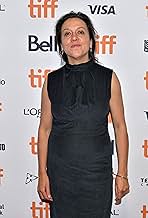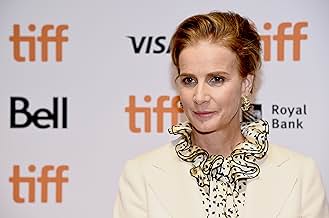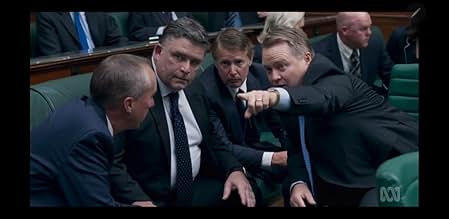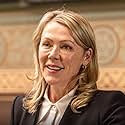Una mujer indígena en Australia se convierte en el centro de atención política.Una mujer indígena en Australia se convierte en el centro de atención política.Una mujer indígena en Australia se convierte en el centro de atención política.
- Premios
- 6 premios y 27 nominaciones en total
Explorar episodios
Reseñas destacadas
Yes, as the nay-sayers mention, parts of the storyline are implausible as most 'deux ex machina' are - ie they are just devices to structure a story, a plot and the characters' actions.
It is fiction after all, story-telling, and the storyline is not meant to be realistic, any more than "CleverMan" or "Secret City" were. Doesnt mean it doesnt have something important to say about Australian reality, while also making entertaining television.
As for those thinking Rachel was a Gillard-style character - I saw her more as a Julie Bishop style character, as in the 'moderate conservative' :-) I would have preferred an Amanda Vanstone style character - just for the novelty of seeing a poorly dressed female PM - but a minor point :-)
Cast, direction, script, the camera-work - all excellent.
Also as a Canberran, and as ex-PS, many elements also made me both laugh and cry. (But enough with the "cold" jokes!)
It is fiction after all, story-telling, and the storyline is not meant to be realistic, any more than "CleverMan" or "Secret City" were. Doesnt mean it doesnt have something important to say about Australian reality, while also making entertaining television.
As for those thinking Rachel was a Gillard-style character - I saw her more as a Julie Bishop style character, as in the 'moderate conservative' :-) I would have preferred an Amanda Vanstone style character - just for the novelty of seeing a poorly dressed female PM - but a minor point :-)
Cast, direction, script, the camera-work - all excellent.
Also as a Canberran, and as ex-PS, many elements also made me both laugh and cry. (But enough with the "cold" jokes!)
Anyway Deborah Mailman shines as the central character of a Queensland senator handpicked by the PM to fill a vacancy.
Having watched the first episode it has so much potential and already questions arise about the motives of the PM (Rachel Griffiths) and where this is going to head.
Looking forward to the next episodes,
Well, I just watched the final episode, and all I can say is WOW. Well done to the writers, and the overall quality is excellent. I love the use of the old Parliament house chambers. The cast give powerful and emotional performances, particularly Deborah Mailman as Alex Irving, Rachel Griffiths as Rachel Anderson and Harry Richardson as Jonathan Cosgrove. Celia Ireland as Tracey Helliar is really growing into her part. Shantae Barnes Cowan as Jess Clarke is a natural, taking us all with her. Gosh William McInnes as Laurie Martin has come a long way since Sea Change, always brilliant. To all the cast and crew, thanks for this very entertaining series. It will become a classic.
I was thinking the first couple of episodes were rather formulaic, not believable and a tad pedestrian. There are some ponderous issues raised, such as how an unknown woman from the bush (and not even a party member) becomes a senator to occupy a casual vacancy. Members who've been going to branch meetings for years will be extremely disappointed by the low entry price Alex had to pay to become a senator.
Another point I had incredible difficulty with was how an aboriginal rights campaigner ends up joining the Liberal/National government. Okay, I'm aware of Neville Bonner and even Ken Wyatt, but I still can't see why Mailman's character - completely upset over lack of indigenous services in the bush - could join the (now) government.
As the episodes proceed, however, and we get to know the characters, the emotional side starts to shine through, and the series massively improves. Not wishing to reveal spolers, I think the main change occurs when Mailman has to race back to her home town to deal with a pressing issue there. That's treated with humour and sensitivity, and humanises the character and the whole series.
Some of the political procedures shown are simply not correct, but perhaps the series can be forgiven for taking shortcuts. However, to a regular watcher of parliament, it grated on me a little about how someone can just stand up in parliament and make a statement or even move a motion without going through the correct procedural processes.
What's interesting is that most of the imagery in parliament house is shot in the new parliament house (Opened in 1987), but when we enter the House of Reps or Senate chamber, we find ourselves down the road at Old Parliament House. I suppose it was a lot easier for the locations manager to book old Parliament House than the new, or indeed for a set to be constructed.
Certainly a worthwhile watch, and I encourage people to not judge this on its first two episodes - it gets a lot better - but far from perfection as some reviewers here would have you believe.
Another point I had incredible difficulty with was how an aboriginal rights campaigner ends up joining the Liberal/National government. Okay, I'm aware of Neville Bonner and even Ken Wyatt, but I still can't see why Mailman's character - completely upset over lack of indigenous services in the bush - could join the (now) government.
As the episodes proceed, however, and we get to know the characters, the emotional side starts to shine through, and the series massively improves. Not wishing to reveal spolers, I think the main change occurs when Mailman has to race back to her home town to deal with a pressing issue there. That's treated with humour and sensitivity, and humanises the character and the whole series.
Some of the political procedures shown are simply not correct, but perhaps the series can be forgiven for taking shortcuts. However, to a regular watcher of parliament, it grated on me a little about how someone can just stand up in parliament and make a statement or even move a motion without going through the correct procedural processes.
What's interesting is that most of the imagery in parliament house is shot in the new parliament house (Opened in 1987), but when we enter the House of Reps or Senate chamber, we find ourselves down the road at Old Parliament House. I suppose it was a lot easier for the locations manager to book old Parliament House than the new, or indeed for a set to be constructed.
Certainly a worthwhile watch, and I encourage people to not judge this on its first two episodes - it gets a lot better - but far from perfection as some reviewers here would have you believe.
Deborah Mailman seizes our attention from the start and holds it unwaveringly in the first episode and the script writing and camera work back her all the way. The caricature of the 'Canberra bubble' carried by a cast of instantly recognisable and strong actors fitted comfortably into my prejudices while Rob Collins gave a moving performance as the Senator's brother. This series is exciting - almost enough to wipe the lingering aftertaste of "Pine Gap"!
¿Sabías que...?
- CuriosidadesOriginally entitled "Black Bitch" but this title was deemed too controversial.
- ConexionesFeatured in The 62nd Annual TV Week Logie Awards (2022)
Selecciones populares
Inicia sesión para calificar y añadir a tu lista para recibir recomendaciones personalizadas
- How many seasons does Total Control have?Con tecnología de Alexa
Detalles
- Fecha de lanzamiento
- País de origen
- Idioma
- Títulos en diferentes países
- Полный контроль
- Localizaciones del rodaje
- Winton, Queensland, Australia(location)
- Empresas productoras
- Ver más compañías en los créditos en IMDbPro
Contribuir a esta página
Sugerir un cambio o añadir el contenido que falta

Principal laguna de datos
What is the Japanese language plot outline for Total Control (2019)?
Responde






















